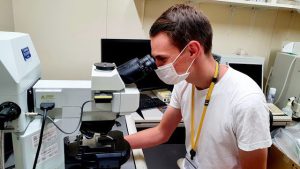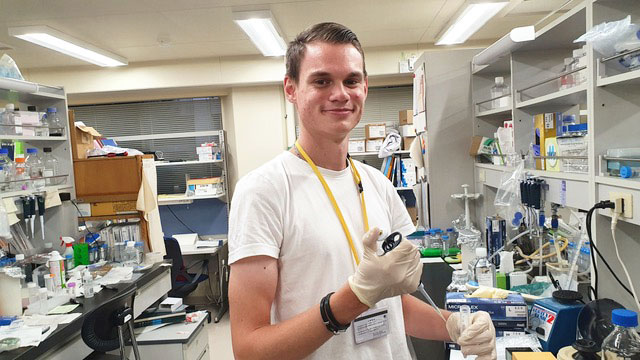Information of the Applicant from German University:
- Prof. Dr. Geraldine Zimmer-Bensch(RWTH Aachen University, Institute of Biology II)
Duration of Stay:
- August 2 to October 28, 2022
Aims:
- Build up a new scientific cooperation between Japan and Germany / Improving of international scientific exchange.
Visited Researchers and Institutions in Japan:
- Prof. Dr. Mineko Kengaku, Institute for Integrated Cell-Material Sciences, Institute for Advanced Study
Participated events; conferences, seminars, etc. in Japan:
- iCeMS Retreat 2022 – Linking Chemical and Biological Science- (September 14, 2022, Kyoto)
Motivation for Kyoto-DAAD Programme
Building up scientific networks abroad and learning new experimental techniques to analyze microtubule organization
Brain development is an enormous complex process and developmental defects are associated with a diverse spectrum of neurological and neuropsychiatric diseases. A crucial step is the migration of young post-mitotic cells generated from progenitors in proliferative niches towards their target regions. Apart from directionality, cytoskeletal rearrangements underlie migration dynamics and have to be highly orchestrated to ensure proper neuronal numbers in their respective target regions. I applied for the DAAD grant to initiate a cooperative research, built up scientific networks abroad, and to learn new experimental techniques to analyze microtubule organization underlying the migration dynamics.
Achievements and Outcomes of ECRs’ Stay
Experience of a high excellence research environment in a foreign country
My stay at the iCeMS in Japan was excellent and I enjoyed it so much, due of the following reasons: I was perfectly introduced to and integrated into the lab team, lab schedule, and experimental procedures. As a result, I was able to work independently in the lab and to plan my experimental series and schedule. Here, I had my first acquaintance with how a lab outside of Germany is built and structured. Moreover, I met many excellent researchers and experts abroad, who gave me new ideas and perspectives to improve my further analysis and experiments. So, my personal scientific network was enormously upgraded, which will be important for my academic career in the future. Furthermore, I significantly advanced my professional English-speaking and presenting skills, through weekly lab meetings and progress reports, which will be useful for further scientific talks and presentations. I also learned a lot about the work-life balance of researchers in Japan. With the experiences I made there I am now able to reflect on my personal work-life balance and compare it with my experiences obtained in Germany so far. In sum, by working in foreign state-of-the-art research facilities, I now better understand the different styles of research environments between Germany and Japan, being now able to integrate this in my current and future work life.
Outlook for the Project
With this exchange project, we aimed to establish and foster a strong cooperation between our department at the RWTH Aachen University in Germany and the iCeMS at the Kyoto University in Japan to improve the research on the cause of different neuronal migration disorders. This stay gave me new ideas and I learned various new techniques, which will improve our research in the future. Moreover, this internship gave me the possibility to reflect on Japan as a research environment and my personal strengths.

![[間:AI DA]: supporting international carrier development of early career researchers (ECRs)](/exchange/aida/wp-content/themes/kyoto-u-daad/img/logo-aida.png)



